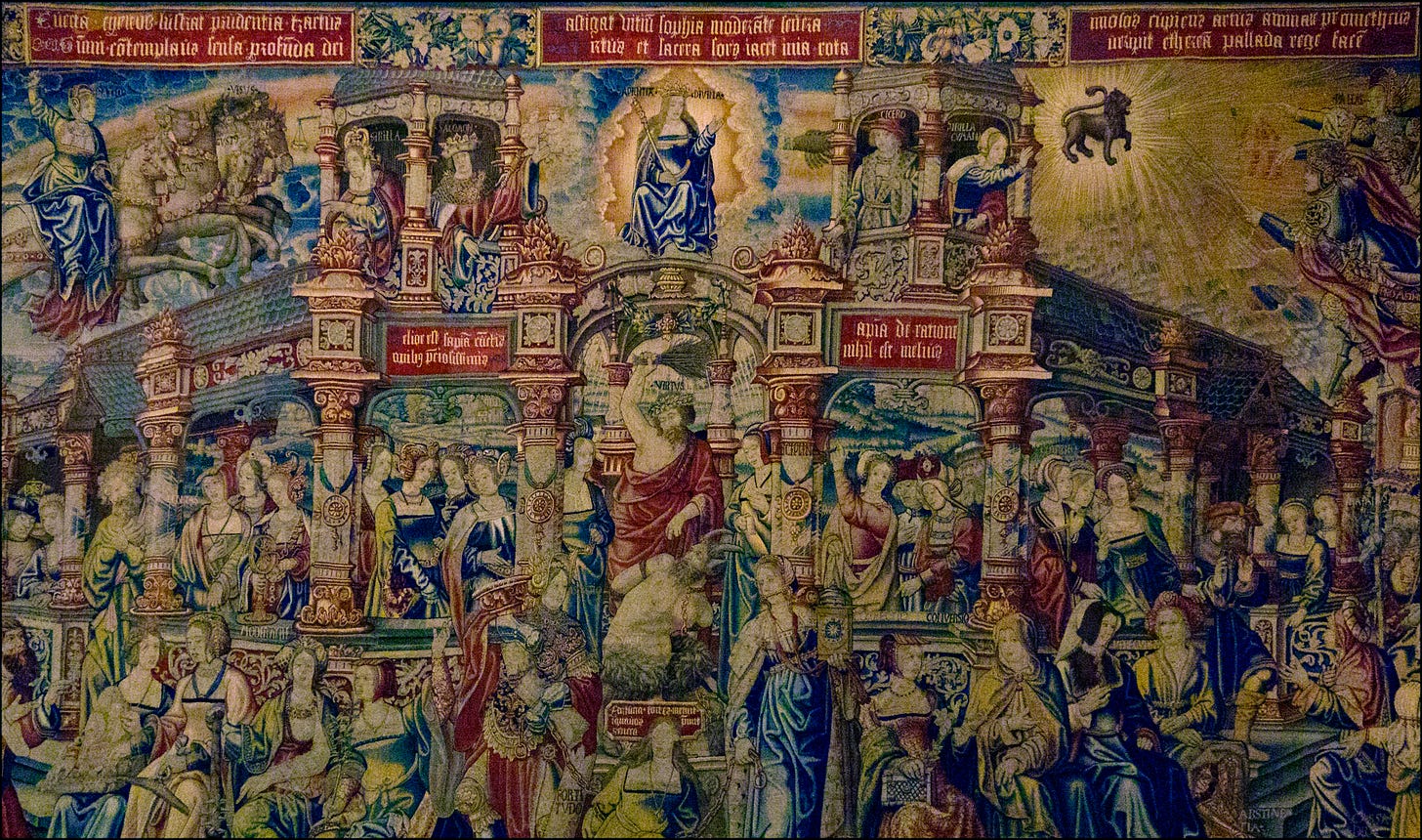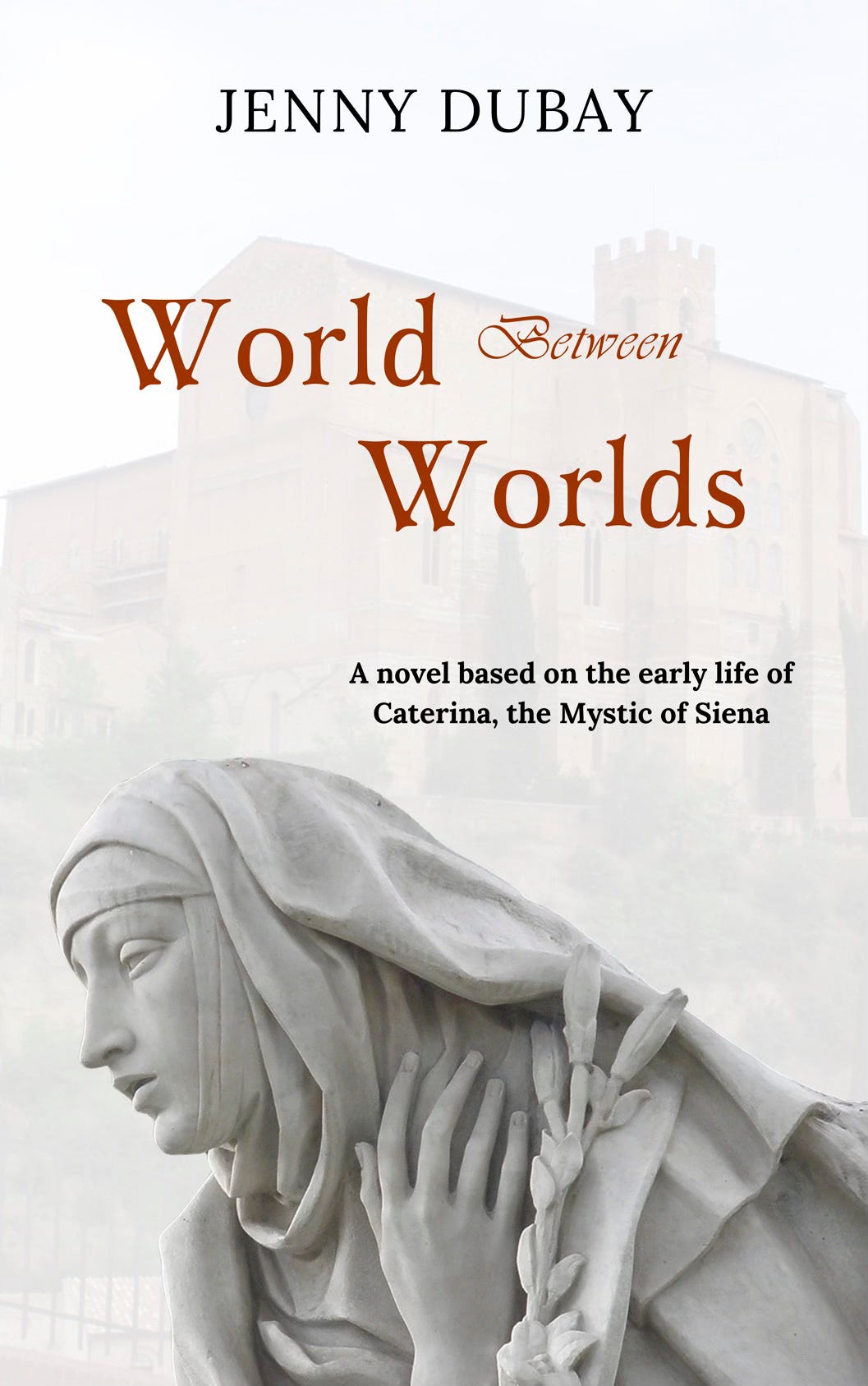When Tragedy Strikes: A Letter to Nella
A fictional epistle based on the spirit and voice of St. Catherine of Siena
Why does God allow tragedy and trauma? This is a question that has been plaguing humanity since the beginning of time, one that we all strive to understand—especially during times of great catastrophe and loss. God has given us all free will, but why does He allow the free will of others to infect us so greatly? How can we begin to understand the necessity of His permissive will?
St. Catherine of Siena lived in a time of extreme turmoil. From recurring deadly plague to wars both internal and without, the fourteenth century was a time of calamity and upheaval. Loss and tragedy were topics Caterina was very familiar with, and I can well imagine how she may have responded to our continued cries for understanding.
As I dive into the exhilarating work of researching and writing the sequel to World Between Worlds, my novel based the early life of St. Catherine of Siena, I’ve decided to share a few excerpts with my readers.
St. Caterina was an avid letter writer. Over 380 of her letters still exist, but we know she wrote far more than what we have today. These epistles are treasures to all devotees of Caterina, for unlike Raimondo of Capua’s account her life, they speak in her voice and reveal more of her personality than we find in Raimondo’s hagiography.
In 1375 Caterina was asked by the ruler of Pisa to visit the city, and while there she stayed with the Buonconti family, where she became close friends with Nella, the matriarch of the family. Below is a fictionalized letter Caterina writes to Nella, based firmly on our saint’s theology and insight. Although I wrote this letter in Caterina’s voice, the passages in bold are direct quotes from an actual letter she wrote to Nella not long after the death of her husband (Letter T151a, translation by Suzanne Noffke).
To Nella Buonconti of Pisa:
I Caterina, servant and slave of the servants of Jesus Christ, am writing to you in His precious Blood. I long to see you grounded in true perfect patience, since there is no other way we can be pleasing to God.
I am sorry to hear of the great misfortune which has overcome you. In these times of very many trials and troublesome chaos, we must keep in mind one thing: the goodness of Christ crucified, His sweet fragrance of grace and mercy.
Where is this mercy to be found? When our souls are darksome due to earthly trials, this is indeed a question that often vexes us, for mercy seems far off to our human comprehension. This is because our lives are a rich, multi-layered tapestry, full of vibrant colors and delightful scenes—yet the scenes of our lives cannot be made without shadows, for shadows balance the light and create texture and depth. Our human vision can only see one corner—nay, one thread—of the tapestry of our lives, while God—the Creator of the tapestry—can see the entire grandeur. When our vision is darksome because we are gazing at a shadowed thread within the scene of our lives we are tempted to despair, thinking the entire tapestry must thereby be in shadow.
This is not so! We must strive to look beyond, and pray for the grace to develop the eyes to see. Lord, heal my eyesight! Clear my vision, that I may see as You see, and will as You will!
We must remember the goodness of God, understand His rich blessings, and with the hand of free will we must desire all He desires for us—whether riches or poverty, health or ill, joy or sorrow. God wants nothing but our sanctification, and in all things He brings forth our ability to grow in virtue and love.
What must be the foundation of this clear vision? The house of our vision must be built upon two pillars, the very foundation of our interior life: humility and patience.
Oh, sweet patience, you are a fruit of life! In your sweet juice I rejoice, and find nourishment of soul. In you I find justice and grace. Oh, sweet humility! Without you I fall into despair, or selfish self-will. Without you I cannot see the true vision of God, for I am she who is not. God is the One Who Is.
Oh true, oh lovely patience! You are the virtue that is never overcome. No, it is you who triumph. You give us hope for glory. You dissolve hatred and animosity in the heart and liberate us from contempt for our neighbors. You free our soul from pain. You make the heavy weight of hardships light, and because of you bitter things become sweet. In you, patience, we discover life.
My dearest mother, patience truly is the most essential of all virtues, when seasoned with humility. We cannot cross this sea of life without waves battering us, churning us this way and that, and quite often crashing us to a shoreline we do not desire to visit. And when we are battered, the devil takes advantage by tempting us to despondency. And more: what the devil can’t do himself he does by using other people. He takes up his position on the tongues and in the hearts of his servants and before their mind’s eye. He makes them see what doesn’t exist. So they conceive within their hearts all sorts of evil thoughts and resentments regarding their neighbors—often regarding those they most love. Once they have conceived these things within, the devil takes up his position on their tongue and causes them to give birth to them in words. Words lead to actions, and this is how he divides those who love each other. This is the source of the impatience and antipathy and hatred that deprive people of the unity of love.
Do not believe the lies of the evil one and those he tempts to be his ambassadors! Renounce and reject, for these lies are the enemy of Truth. We must defend ourselves against this dangerous wave, this assault to our spirit and our very beinghood. And how do we mount the chariot of defense against evil assaults? We must open our mind’s eye to God’s goodness, to His holy will. Why does He permit these assaults, why does He allow the devil’s messengers to plague us?
God has given us free will, which He will never violate. Yet we violate our own free will when we use it unjustly, when we allow our will to be dictated not by God’s goodness, but by the evil one. And why does God allow our neighbor’s evil free will to infect us? Because virtue is tested in its opposite. We cannot taste the fruit of virtue without first ingesting the bitterness of vice. Impatience leads us to strive for the peace of patience, pride hollows our souls with restlessness and causes us to seek spiritual fulfillment in humility.
Remember the tapestry of our lives. We must not look at one thread in the tapestry, but must strive to have faith that there is far more we cannot yet see. For God neither wants nor seeks anything but that we be made holy. He allows the devil to cause others to torment and harass us only to prove the virtues of love and true patience within us, and so that our imperfect love may become perfect. For the virtue of love is proved and strengthened in interaction with our neighbors.
This is not to say we should tolerate abuse and mistreatment. No, quite the opposite! Patience teaches us to love ourselves for God’s sake. We must be patient with ourselves. Patience also teaches us to love our neighbors for God’s sake, not for our own profit or for the joy or pleasure we may find in them but because God created them and loves them. And how do we show this love for neighbor? By not allowing them to sin against us. Instead, remain steadfast in the truth of who God created you to be: a child of the Father, a bride of the Divine Bridegroom, a vessel of the Holy Spirit.
I’ll say no more. Keep living in God’s holy and tender love. Gentle Jesus! Jesus love!
Special Offer!
If you’re intrigued by the life of St. Catherine of Siena and want to learn more, my adaptation of her early life (part one of a two book series) is currently on sale when you purchase directly from my website.
Learn more about World Between Worlds: A Novel Based on the Early Life of Caterina, the Mystic of Siena.
You can also purchase on Amazon using my affiliate link.





Thank you for this! It gives me much to think and pray about!!!!!